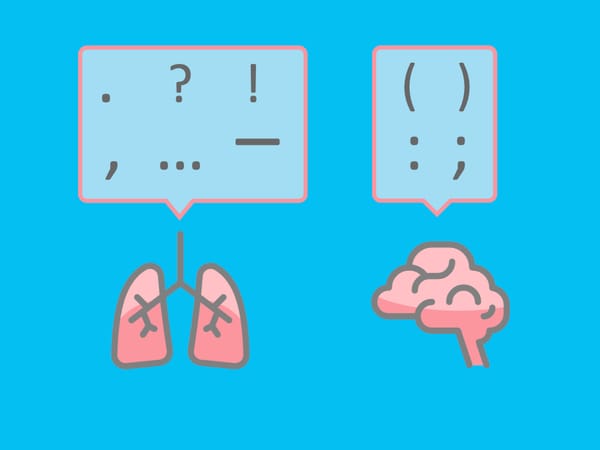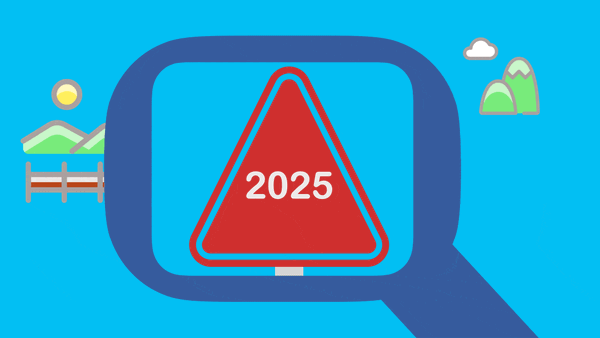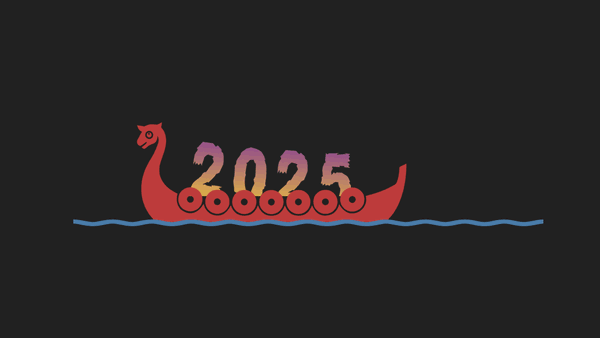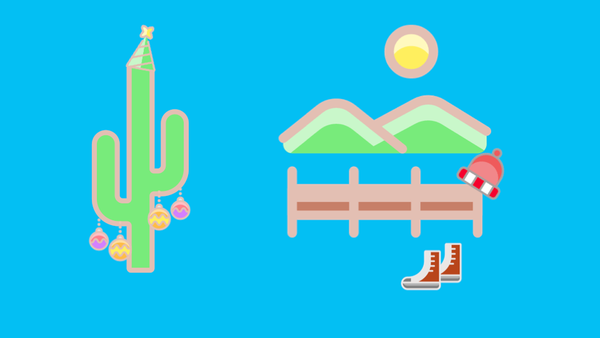Finessing Dunning Kruger

So I decided to produce a cabaret show. Which I had never done before. And I decided to sing lounge music in it. Which I had never done before. And I decided to bring it to the Edinburgh Festival Fringe, which I had never even been to before. And I worked with a music director, scheduled rehearsals with the other performers, created posters, playbills and flyers, wrote press releases and marketing materials, and scheduled trial shows. All of which, you guessed it, I had never done before.
I even learned how to puppeteer because somewhere along the line I thought it would be fun to have the main character be a lounge-singing puppet. And, of course, I had never puppeteered before.
As I've described the Edinburgh Fringe before:
It was a transcendent experience, and it nearly killed me.
I'm not complaining – I would do it all again. Everything turned out well: happy audiences every night of a one week run, including two capacity houses. And, importantly for me, a good time was had by all my collaborators.
Getting to Edinburgh was ultimately a two year project. Two years crawling over 25 pages of script. I had to stay motivated that entire time, and switch back and forth from wide-eyed enthusiasm to steely judgement depended on when and where we were on the project.
And somehow I did it. And it wasn't until later that I could look back and see just how I managed to balance passion and skepticism, applying each when needed:
I finessed Dunning-Kruger.
That sounds like some obscure skateboarding trick, but it's actually a useful way to maintain focus throughout a project. Let's talk about it after the news.
What’s going on?
- Welcome, Kristin and Richard!
- Sometimes when I'm super tense, I get crazy productive. Like now. I just finished a 1.5 minute animated poem, and have sent it to a film festival it's uniquely suited for. And I finished up the scripts and animations for another longer video. Next steps are audio and editing. It's nice to have something moving ahead in my least favorite month of the year.
What is this Dunning-Kruger thing, anyway?
You probably heard of it before. The Dunning-Kruger effect says that people who are inexperienced at a task will overestimate their ability to do it. And people have extrapolated that to say that highly experienced people will underestimate their skills.
The whole thing has been expanded, stretched, misquoted, rolled into a ball, and otherwise worked into popular culture in ways that Drs. Dunning and Kruger probably didn't expect.
And the Dunning Kruger effect may not even be what we think it is, at least according to this Scientific American article with the on-the-nose title, The Dunning-Kruger Effect Isn’t What You Think It Is.
But I don't care. I don't want to talk about what the Dunning-Kruger effect is. I want to talk about how it feels.
Starting a New Project: A Love Story
When a new idea shows up, I'm excited. I'm energized. I can't wait to get started. Then, as I struggle to get the blinky cursor to leave the right words in its wake, this happens:
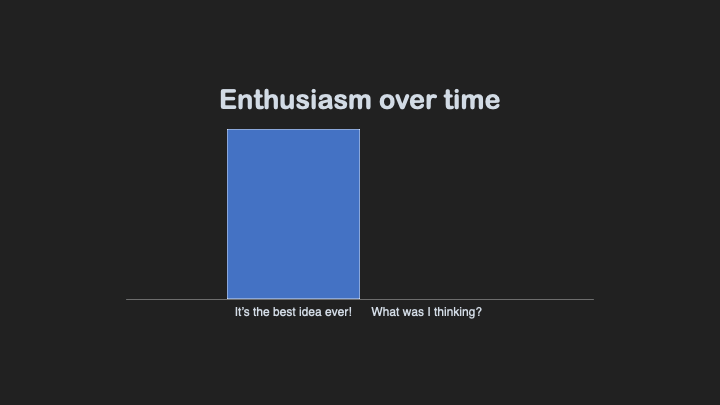
I used to think that the waning enthusiasm was the idea's fault. It just wasn't good enough, and I needed to look for a new one. Then I wised up. This always happens. The idea always starts to fray when I work on it. Because the idea is never perfect. It needs to be workshopped, modified, edited, worked on.
So I realized I need both of those bars in the graph above. The big blue bar gets me going and keeps me going. Then its orange pal focuses me on the needed fixes. I need to get a little disillusioned so I can judge strengths and weaknesses.
To tie it back to Dunning-Kruger, ignorance of my limitations is useful at the beginning, to forestall paralysis. Like ignorance about cabaret, or puppeteering, or marketing a show. Later, doubt of my own expertise keeps me from slacking. And hoo boy, do I have doubt.
Rekindling the Romance
So for a short project, that's the path: get idea, polish idea, release.
What about longer projects, or projects with different moving parts that are projects themselves? Are they just a burst of enthusiasm, and then a long slog through the magical land of "What was I thinking?"
Been there, done that, wept into the t-shirt. It's no fun living for that amount of time in the harsh judgement zone.
For longer projects, like Edinburgh was, I need to make my enthusiasm over time look more like this:
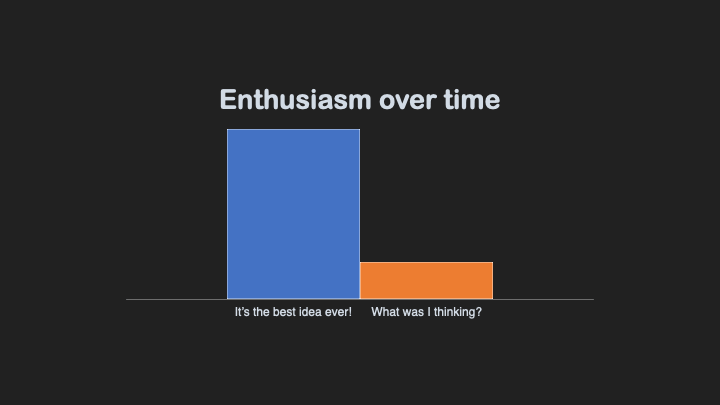
There are times to be crazy optimistic. There are times for a steely, critical eye. And either one can be needed at any time. Maybe even simultaneously. So how do you get back to that initial enthusiasm?
I can't turn back time. Even Cher can't, and she's, well, Cher.
But I have soldered together some tactics that I use to try and keep myself in the right mind set throughout a project:
Get corroboration
When it's just me in a room, it's easy to lose focus and start to question every decision that led me up to that point, sometimes going back as far as decisions made in middle school. So I will occasionally check in with one to two trusted people, and hold the project up to them like a carton of suspect milk. "How does this smell? Does this smell OK to you?" Sometimes also known as the "vomit test," this quick test reassures me that at least the idea isn't actively toxic, and I can go back to work on it.
Get collaboration
I have a horror of being considered unreliable, and will work harder for someone else than I will for myself. So if there is someone else on the project, or someone waiting for the project, I will power through any doubts. Because I figure turning in something not perfect is better than not delivering at all.
The Edinburgh project had two main (talented, wonderful) collaborators, plus all our spouses as crew. My chief goal became to make sure they all had a good experience. So my love for the team provided a whole new set of motivation throughout the project.
Decide you're motivated
Yes, decide. Treat motivation and inspiration as a choice from within, not some gift from the creative ether.
Sounds weird, but you can just tell yourself that you are happy and motivated about your project. Are you pretending? Yes, but that is remarkably close to the real thing. After all, it's your brain, you can decide what to think.
I know, I know, it's really not as easy as all that. Doubts and fears hover around you like horse flies, and holy crap, do they bite. I'm always tempted to run out of the room when I hear the buzzing.
And of course that works as well as the time an earthquake hit when I was in the coffee room at work, and I quickly ran out into the hallway, because there was an earthquake in the coffee room. My tactic did not work, as the earthquake was a lot less localized than I had hoped.
So I can't run away from those bitey negative thoughts. But I can swat them back, like the pest bastard flies they are. I just flap a hand at them. They scatter. And you know what happens then?
They come back. Every time, they come back, the jerks. So I swat at them again, and again, and again. And after awhile, they slow down, they take longer to return. They even get smaller. Eventually that swarm of horse flies turns into a handful of disorganized fruit flies. Just some minor irritations careening around.
I never get rid of them. But I can reduce them, and give myself and my motivation a little elbow room.
Know when to unleash the beast
It's easy to treat the "What was I thinking?" bars in the graphs above as "Bad," but like sharks and dung beetles, they serve a real purpose in the web of (creative) life. I can't edit, workshop, polish, or insert-your-own-improvement-verb here, without being critical of my work. Some of my worst experiences creatively came from never being harsh with a project. I just joyously barfed it out and threw it at people. The experience was as unpleasant as that metaphor.
So I try to know when to tip my glasses down and glare disapprovingly at my work. For me, and I'm betting for you, too, this comes easy. I'm great at second-guessing myself. So I also try to remember to push my glasses back up for first drafts, ideation, presentation and anytime where being critical would disrupt the flow of getting new stuff made.
Remember the advantage of “here” and “now”
Every project exists in both time and space. So once you begin your project, once you start the clock, you automatically become one of the best possible people to finish it.
Was I the best person to take on all the projects that collectively became the project of getting a show to the Fringe? Oh, h*ck no. But here's the thing: I was there, in space and in time.
Suppose I decided bring on someone more qualified for one or more aspects of the project. I would have had to stop the project while I tried to find out:
- Who are they?
- Are they available?
- Are they affordable?
- Do they even want to work on the project?
And even if all that works out, I would still need to set up materials and meetings to get them up to speed. And then redefine the schedule and spec of the project itself to account for this new person coming onboard.
Hiring staff would have changed the scope and intent of the Edinburgh project. We just wanted to make a few people laugh. Get in, get out, nobody gets hurt.
All that said, I did not do everything myself. Everyone in the show, and their spouses, all did a lot more work than just memorizing lines. They, too, were already there in space and time. So they were the best people in the world for the job.
So sometimes I have to remind myself, when I'm in the middle of a project and I start to doubt, that I am in the best position of anyone in the world to finish that job. Maybe not the best person in the world to in an objective "thought experiment" sense, but the best person to finish the project that I'm working on here and now.
Fun facts to know and share
Another way to stay motivated: work in front of a crowd.
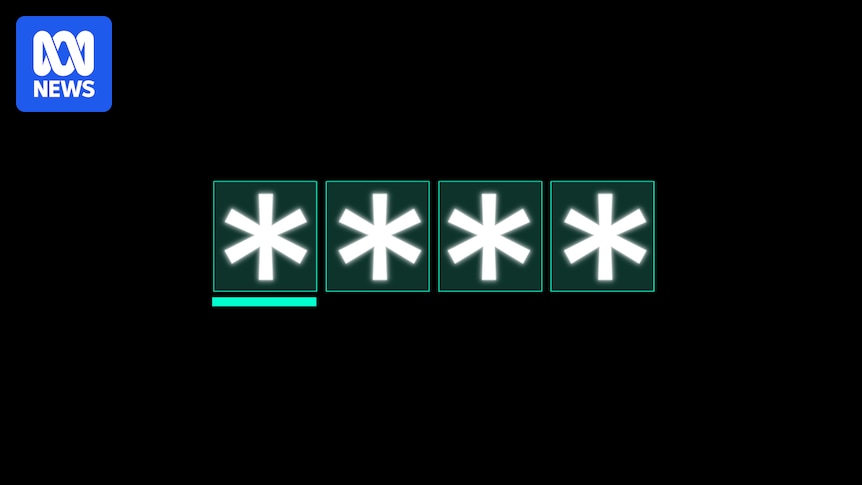
History (of past security breaches) has taught us nothing.

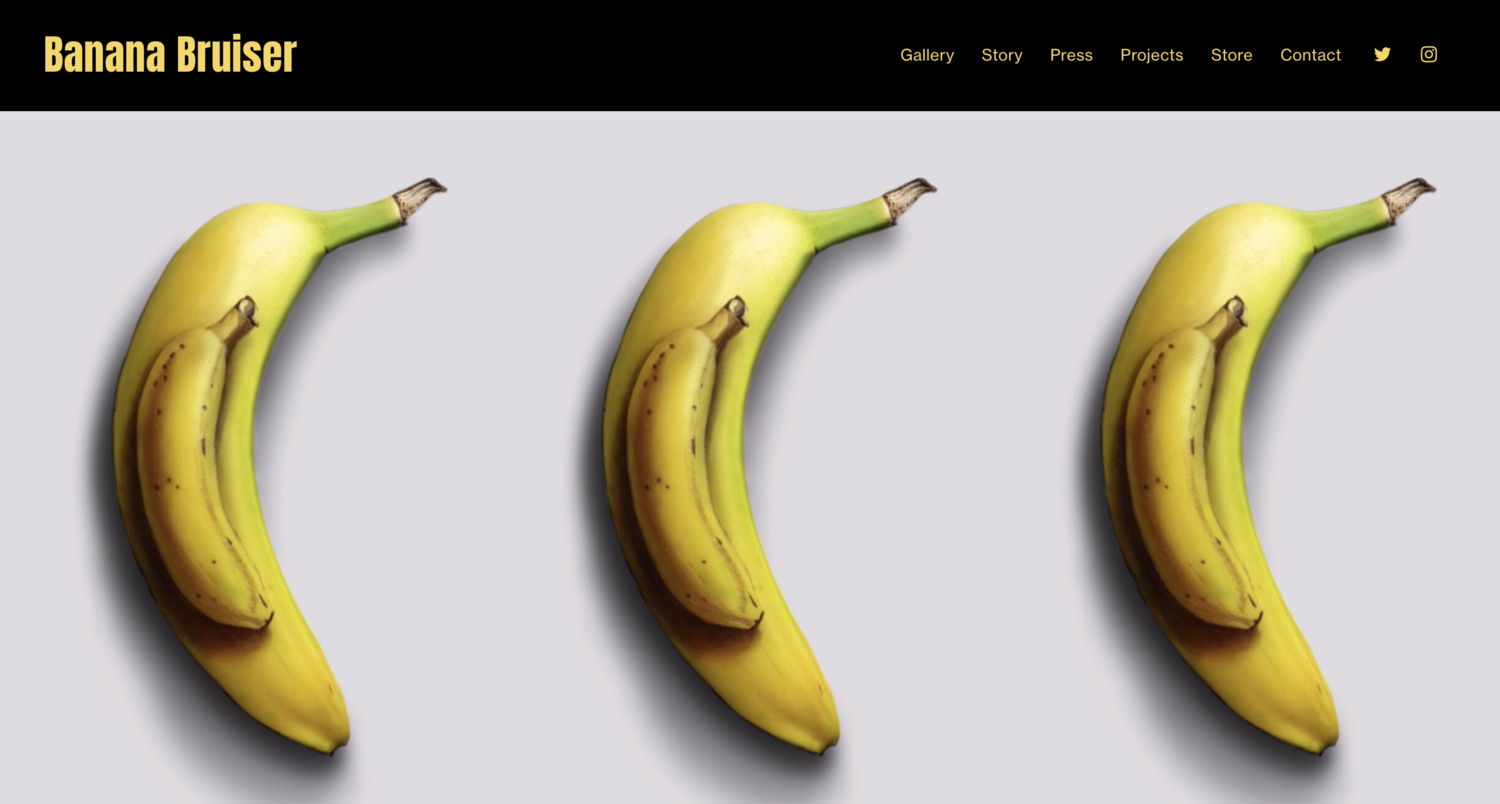
No duct tape. Just some original thinking and real art skills.

So who has trademarked their products' scents? Not who you'd think. (From www.visualcapitalist.com)
Over to you
So that's part 1 of the (delightfully pretentiously named) Edinburgh Cycle. Next week, we'll talk about another way to turn a seeming negative into a powerful creativity focus when we Gather restrictions.
"Wait – aren't restrictions...restricting?"
Mais non, mon ami. I find the right ones to be liberating.
Until we talk again, I remain,
Your pal,
Jamie
P.S. Do I like italics? Yes, I do.



